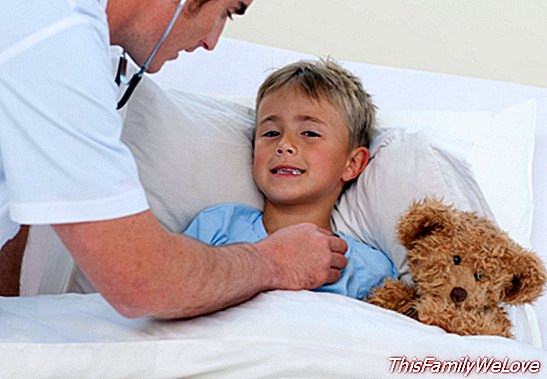Pneumonia or pneumonia, keys to prevent and treat
If your child has a fever, ribs are scratched and you breathe faster than normal or have trouble doing it, watch it: you may have pneumonia. Every year, on November 12, the World Pneumonia Day, also known as pneumonia, a severe and very frequent disease that affects one in every hundred people a year.
Pneumonia is a disease of clinical suspicion that affects the lungs. But not only the children, but also those of adults and the elderly. The difference is that in the case of adults, pneumonia is caused by bacteria, while in the case of children, pneumonia is usually the product of one of those viruses that arrive with the return to school and that in June they go on vacation.
Symptoms of pneumonia or pneumonia
Fever, chills and sweating, productive cough with mucous expectoration, chest pain that increases when coughing, headache. Muscle and joint pains, lack of appetite, weakness, difficulty in breathing and crackling rales at pulmonary auscultation, in the affected area, are some of the obvious symptoms of pneumonia.
Dr. Daniel Blázquez Gamero, pediatrician specializing in Infectious Diseases at the Hospital 12 de Octubre in Madrid, recommends that if the symptoms of pneumonia described are observed, he should go immediately to the doctor. When he listens to his lungs, he will identify a series of characteristic noises in them. This way you will know if it is pneumonia or, on the contrary, of an alternative respiratory deficiency motivated by different causes. The diagnosis can be confirmed by a simple x-ray.
Cough: a key symptom of pneumonia

Of course, cough is also one of the most obvious symptoms of pneumonia. Its duration, once the infection is over, is very variable. It all depends on what type of virus or bacteria caused the pneumonia. In this sense, Blázquez Gamero argues that, on average, the children usually prolong the cough one or two weeks. During this period, it is not advisable to occupy very dry rooms, they should be well wrapped and take temperate foods, never too hot or too cold. This will prevent your vocal cords from suffering more than they already do. They should also drink enough fluids. Water and natural juices are very healthy and help prevent dryness and dehydration.
During the two weeks that the cough may continue is no longer necessary, unless the pediatrician deems it appropriate, continue administering antibiotics to the child. To his consumption, by the way, we will have resorted only in case the infection has been produced by a bacterium and not by a virus. Something that does not usually happen in the case of children.
On the other hand, it is convenient to provide some medicine if the symptomatology of the infection worsens. In addition, if we see that the child lacks oxygen to breathe properly or that he has vomiting that prevents him from taking the antibiotic orally, his hospitalization is always necessary. When the child shows signs of seriousness, such as extensive pneumonia or decay, they should also be admitted to a medical center.
What children are susceptible to pneumonia?
Pneumonia occurs frequently during the cold winter months, but can occur at any time of the year and, of course, can occur at any age. On the other hand, it is especially common in children under four years of age, and those who have problems with their defenses (immunodeficiencies) are more at risk of suffering from it. Also those who take immunosuppressive drugs or those who have respiratory structural alterations such as cystic fibrosis and pulmonary malformations. On the other hand, children suffering from neurological problems such as cerebral palsy are also more likely to suffer from pneumonia.
The pneumonia vaccine
There are two types of pneumococcal vaccines:
1. Pneumococcal 23-valent polysaccharide vaccine, which protects against 23 pneumococcal serotypes, among which 90% of those that cause serious infections are found. It has the disadvantage that it is not effective in children under 2 years of age and provides little lasting protection (around 5 years in healthy adults).
2. Pneumococcal conjugate vaccine: there are two vaccines, one that protects against 100 serotypes of pneumococcus and another that protects against 13 of these serotypes. They have 97% efficacy in the prevention of meningitis and infection of the blood, protect from pneumonia and have a moderate protection against acute otitis media caused by pneumococcus. They can be used in children up to 5 years of age and one of them (the one that contains 13 serotypes) can also be used in people aged 50 or older with certain chronic diseases.
Tips for treating pneumonia at home
If your child currently has pneumonia, these pediatrician's tips will help you control the infection and take care of the child at home.
- Monitor the general condition of the child and his breathing difficulties.
- Accustom your child to wash their hands often, especially when eating.
- Offer plenty of fluids.
- Avoid sudden changes in temperature.
- Do not neglect at home the consumption of fruit and vegetables.
- Yogurts help keep our defenses alert.
- A second pediatric evaluation is necessary if, despite the antibiotic treatment, the fever persists or we see that the child breathes with greater difficulty.
Elisa García Faya
Adviser: Dr. Daniel Blázquez Gamero. Pediatrician Specialist in Infectious Diseases of the University Hospital 12 de Octubre, Madrid.




